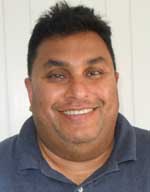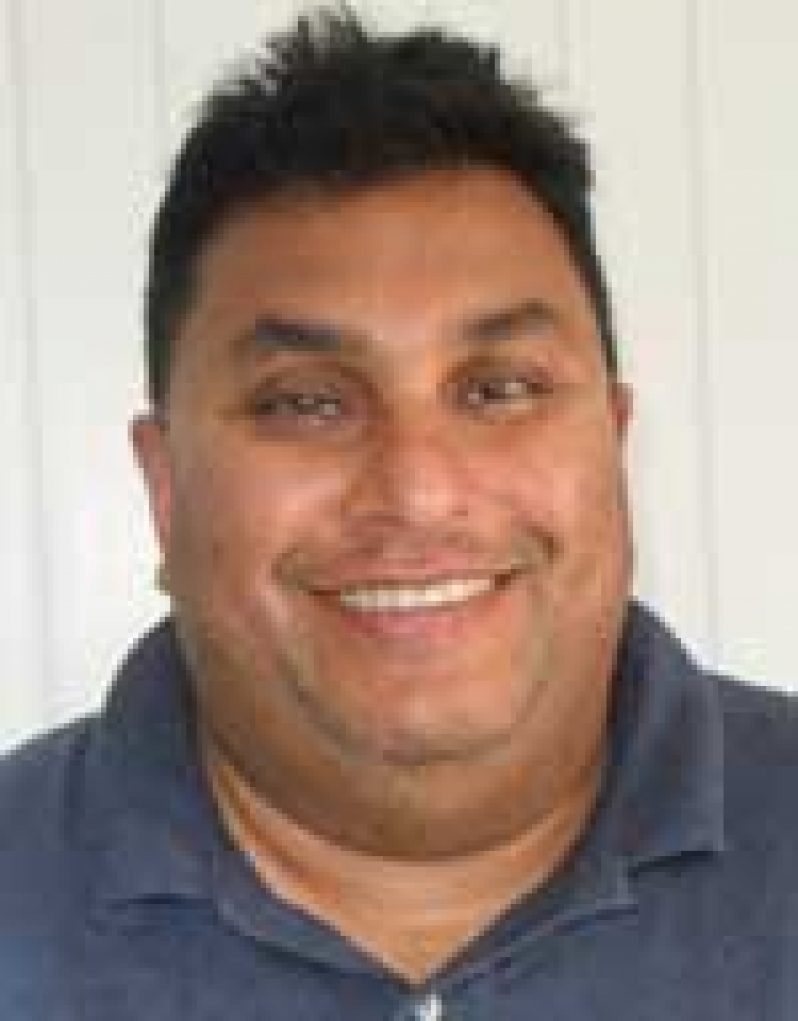A MIGRANT Guyanese-born Nursing Professor, who has spent the greater part of his life working in hospitals in the United States, and who visits Guyana occasionally for the purpose of upgrading the patient-centred skills of nurses here is impressed with what he’s seen of the local nurses.
 Mr. Rowland Ramdass, a doctorally prepared nurse working at the New York Presbyterian Hospital of Cardiology, and who also works at the Birmingdale State College, recently concluded his third round of voluntary training for nurses at the Georgetown Public Hospital Corporation. These voluntary contributions are all aimed towards improving nursing at GPHC so that patients would ultimately benefit from a better nursing care.
Mr. Rowland Ramdass, a doctorally prepared nurse working at the New York Presbyterian Hospital of Cardiology, and who also works at the Birmingdale State College, recently concluded his third round of voluntary training for nurses at the Georgetown Public Hospital Corporation. These voluntary contributions are all aimed towards improving nursing at GPHC so that patients would ultimately benefit from a better nursing care.
Having started with a mere 15 nurses in 2010, he has, to date, already coached more than 150 keenly enthusiastic and responsive nurses; and Dr. Ramdass tells of feeling buoyed, gratified and imbued with greater zeal and enthusiasm each time he comes to do that work in Guyana.
Dr. Ramdass told the Sunday Chronicle in an exclusive interview, about some of the things that keep him buoyed about the programme: “I was most impressed by the professionalism of the nurses, and their quest to learn and improve their skills. I was impressed with their eagerness to learn new things, and apply what was discussed on their project.”
He has been coming to Guyana twice per year over the last three years, on a mission of ‘giving back’ to the country of his birth; and this has been in the form of conducting lectures to Guyanese nurses in patient-centred care, since, in his view, there is so much that he could share.
He first came in 2010, then again in 2012, and with a passion for the task at hand, returned to Guyana at the start of 2013. He related how heart-warming and rewarding it was to find that the nurses were actually practising what has been taught them on the project. Hence, it has been a ‘win-win’ situation for the patients, the nurses themselves, their coach — Dr. Ramdass — and the hospital as a whole.
And just what was it that made him want to embark on training for the nurses at the Georgetown Public Hospital (GPHC) initially? Dr. Ramdass modestly replied: “The nurses’ skills needed to be updated. They needed to be aware of new ways of treating patients, and they needed to understand (that) the practice of nursing changes.”
And so he embarked upon giving them some of those updates.
Also involved with the Crystal Care nurses, Dr Ramdass plans coming back when the programme gets going here this year.
This time around, he says, his trip was about professional development in the areas of patient safety, medication administration, and the patient-centred care. “We talked about different aspects of nursing care: ID bands for all patients, which will help in improving safe administration of medication and explaining procedures to nurses about caring for patients, which will improve patient compliance and patient satisfaction. We also talked about providing references for nurses to look up medication, and the need for every unit to have a reference book wherein the nurses can go to look up dosages, bi-effects of the medication etc,” he said.
His findings at the conclusion of an initial needs assessment were that: “The nurses’ skills needed to be updated. They need to be aware of new ways of treating patients, and they need to understand the practice of nursing changes.” And so he’s embarked upon giving them some of those updates.
Comparing what previously appeared to be the local nurses’ penchant for migrating to North America and the UK in search of jobs, Dr. Ramdass said he was pleasantly surprised that nurses were no longer even making enquiries about job opportunities in the nursing profession outside of Guyana. Largely, he said, he is of the firm conviction that: the (patient-centred care) nurses here went into nursing because it is a respectable job, a secure job; because they could care for patients, and because they were respected in that job.
Albeit, there are other issues affecting nurses that are no different from the issues he deals with at home in the United States, such as staffing ratio; nurses working extra hours, and nurses working with less resources. It is something that the administration needs to look at every day, based on the acuity of the patient, he said.
Several topical issues were also addressed, such as the ‘blame game’ in the case of administrative errors leading to the death of patients.
Asked what he would say to appease nurses coming under heavy blame in cases where they were not actually responsible, Dr. Ramdass replied: “Errors do happen because of a breakdown in the system. Where there are nurses, there are physicians, there’s policy, there is administration. When these problems occur, there are multiple reasons, but nurses need to be empowered to feel that these things could be reported without their being punished for that.”
He said the administration needs to look at these cases individually and from a systems perspective, to see how things could be changed.
“And this is the model that has been used in the US in top hospitals. We looked at a video presenting the scenario of an error that happened in a top hospital in the US because of systems errors – communication has been the biggest issue.”
Whilst he did not get the sense that nurses were frustrated to the point where they felt like giving up and quitting their jobs, he felt it was reflected that they did not feel fully supported by the administration.
And in the case of the death of a teenager at the West Demerara Regional Hospital, he noted that the nurses were quite concerned about this, and expressed concerns, but from a professional standpoint.
His message to the public and the media in such cases is: “I would say not to jump to conclusions. Not to try the hospital in the press. There is no need to rush to judgment and try the nurses in the press.” He agreed that the hospital is trying to be more transparent, and said it is a good thing.
Dr. Ramdass would like to express gratitude to the administration of the GPHC for their cooperation in having him coach the nurses. He also extends gratitude to the nurses for participating in the coaching sessions; and he would like to thank his wonderful wife, Mrs. Ferozan Ramdass, and their daughter Ariann Ramdass, whose support have always made it possible for him to travel to Guyana to conduct the training programmes.












